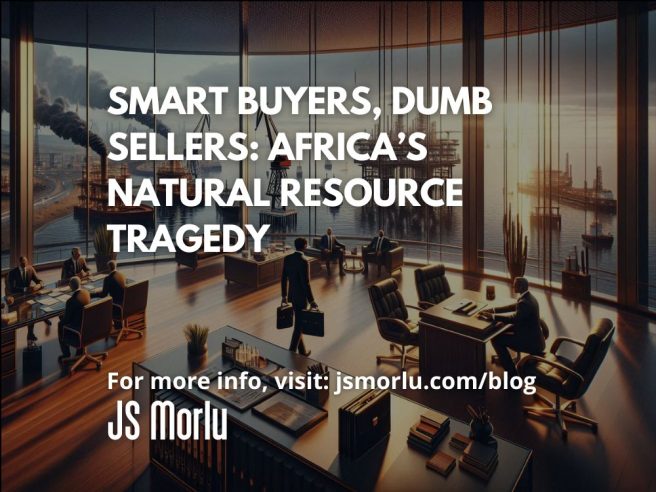By: John S. Morlu II, CPA
Africa has always been rich — rich in soil, rich in minerals, rich in rivers and forests and sun. But rich in negotiations? Rich in valuation skills? Rich in protecting its own resources? That’s where the story nosedives.
Because here’s the sad comedy: Africa’s presidents keep selling natural resources to international corporations without even knowing what those resources are worth. It’s like putting your house up for sale because you need school fees — but without bothering to check what Zillow says it’s worth. Then the “buyer” shows up with three lawyers, two surveyors, and a Bloomberg terminal. Guess who’s going to lose that deal?
The Executive Life Insurance Analogy
Think of executive life insurance. Back in the day, Wall Street firms figured out that you could securitize death — package it, price it, and sell it. But here’s the kicker: when those bonds were auctioned, many sellers didn’t even know what they had on their hands. Apollo and a few sharp funds did. They saw the cash flow, the hidden goldmine, the long tail of value. They bought low, laughed quietly, and cashed in later.
Now replace “life insurance” with “oil block,” “diamond mine,” or “cobalt reserve.” That’s Africa. Our presidents hand out concessions like party favors, often without even commissioning a basic valuation study. Meanwhile, multinational corporations swoop in like Apollo — calculators ready, PowerPoints polished, lawyers on standby — and quietly smirk.
Case Studies in Comedy and Tragedy
- Nigeria’s Oil Blocks
Political cronies are gifted oil blocks for loyalty points. A few years later, they flip those same blocks to Exxon or Shell for hundreds of millions. In 2011, for example, two oil blocks sold for $1.3 billion — blocks that had originally been awarded almost for free to “friends of the presidency.” Nigeria got crumbs; Shell got reserves; the cronies got London flats. - Zambia’s Copper
Copper is Zambia’s lifeblood. But deals are often signed on terms so lopsided that by the time copper prices soar, Zambia is still begging the IMF for balance-of-payment relief. In 2021, Zambia exported $7.6 billion worth of copper, yet still defaulted on its debt. Meanwhile, Glencore — one of the biggest operators — made $5 billion in net profits in 2021 alone, much of it off African copper. - DRC’s Cobalt
The world runs on cobalt — your phone, your Tesla, your batteries. DRC holds 70% of global reserves, but its annual cobalt revenue is less than $4 billion. Compare that to Apple, which makes over $394 billion in a single year, with cobalt as a hidden backbone of its supply chain. One iPhone’s worth of cobalt may cost a few dollars in DRC, but it’s part of a $1,000 product in California. Who’s the smart buyer here? - Liberia’s Iron Ore
Mountains rich in iron ore are auctioned off to foreign firms for peanuts. In the 2000s, ArcelorMittal negotiated concessions where Liberia received less than 5% of the long-term value. Later, the same ore gets shipped to Asia, turned into steel, and sold back to Africa at a premium. We literally sell mountains and buy back shovels.
The Power of Desperation
Why does this keep happening? Because the presidents aren’t negotiating like guardians of sovereign wealth. They’re negotiating like gamblers on a losing streak. Election around the corner? Sell a mine. Civil service salaries due? Sign a concession. IMF loan review coming? Offload another oil block.
It’s not governance. It’s pawnshop politics.
Smart Buyers vs. Dumb Sellers
- Smart Buyers: They come with research. They already know what the cobalt under your soil is worth in Shanghai next year. They’ve hedged it, securitized it, and lined up buyers.
- Dumb Sellers: They come with desperation. They don’t know the value, don’t bother to find out, and don’t even hire neutral experts. They just need the cash advance today.
That’s how Africa exports wealth but imports debt. That’s how we end up with billion-dollar holes in the ground and million-dollar villas in Switzerland.
Punchline: Who Wins?
International corporations win. The presidents win personally (Swiss accounts don’t lie). The people lose. The land loses. The future loses.
It’s the cruel math of “smart buyers, dumb sellers.”
And here’s the final insult: Africa isn’t poor. Africa is rich. But Africa keeps selling its wealth like a villager pawning a gold necklace at the market for the price of cassava.
Final Reflection
If you want a serious business lesson:
- Never sell what you don’t know the value of.
- Never negotiate from desperation.
- And never assume the other side is as clueless as you.
Africa keeps making all three mistakes at once.
Because greatness in global markets is not about what you have — it’s about what you know you have. And until Africa’s leaders learn that, the “Apollos” of the world will keep smiling all the way to the bank.
Norway: The Road Africa Refuses to Take
Now, contrast this with Norway. When they discovered oil in the North Sea in the late 1960s, they didn’t rush to sell it off for short-term cash. They created Statoil (now Equinor), insisted on majority state participation in oil blocks, and built the Norwegian Sovereign Wealth Fund, which today holds over $1.6 trillion in assets. Every citizen is, in effect, a shareholder. The fund is so large that it owns roughly 1.5% of every listed company in the world.
Norway didn’t pawn its necklace for cassava. It locked it in a vault, invested wisely, and built generational wealth. Meanwhile, Africa — with far more resources — still begs for loans to build roads.
The difference isn’t geology. It’s governance. It’s valuation. It’s the difference between smart sellers and dumb sellers.
The Missing Expertise Africa Ignores
And here’s another tragedy. Africa also doesn’t have competent transfer pricing qualified accountants, no AICPA Accredited in Business Valuation (ABV) professionals, no International Society of Appraisers (ISA) experts, no cadre of competent financial engineers guiding deals. The few that exist — brilliant, qualified, and globally trained — are ignored. Dumb African presidents refuse to use their talents, preferring instead to negotiate billion-dollar concessions with advisers who barely understand discounted cash flow. That’s like taking a goat herder to advise you on Wall Street derivatives.
Take Ghana’s infamous Agyapa royalties deal: in 2020, the government pushed to collateralize future gold royalties by selling shares through a Jersey-based company. Independent Ghanaian accountants and valuators raised alarms that the assets were grossly undervalued, but their warnings were sidelined. The deal was suspended only after public outrage.
Or consider Nigeria’s transfer pricing battles with oil majors. International corporations routinely exploit gaps, shifting profits offshore. Nigeria has a handful of tax and transfer pricing experts, but instead of deploying them at the negotiation table, governments rely on political appointees. The result? Billions in lost revenue.
Even South Africa, with its deeper talent pool, saw state-owned Eskom bypass financial engineers and valuation experts in energy contracts, leading to overpriced coal deals and “state capture” scandals.
And perhaps most shockingly: Liberia under President Ellen Johnson Sirleaf. When renegotiating Mittal Steel’s iron ore concession, her government relied not on seasoned valuation experts but on Harvard interns — bright students, yes, but hardly a match for the corporate lawyers and financial engineers on the other side. The result? Liberia left billions on the table. Today, Bea Mountain’s gold mine generates around $1.9 billion annually, while Liberia’s entire national budget barely scrapes $600 million. That’s the tragedy in numbers: a single mine earns triple the national budget, yet the country can’t even fix its roads.
The pattern is clear: Africa has talent. But it refuses to use it.
Closing Punchline
Africa doesn’t lack resources.
It lacks Norways.
And it refuses to use the few financial minds it actually has.
Lessons Learned: What African Presidents Must Do
1. Independent Valuations First – No resource should ever be sold or concession signed without neutral, professional valuations conducted by internationally certified experts.
2. Mandatory Use of Qualified Experts – AICPA ABVs, ISA appraisers, transfer pricing professionals, and financial engineers must sit at the negotiation table, not interns or political cronies.
3. Sovereign Wealth Funds – Model after Norway: capture today’s windfall into tomorrow’s generational wealth.
4. Transparency in Contracts – Every deal should be published and subjected to parliamentary and public scrutiny before it’s signed.
5. No Desperation Deals – Never negotiate because of election cycles, IMF pressure, or salary arrears. Desperation always guarantees a bad bargain.
Author: John S. Morlu II, CPA is the CEO and Chief Strategist of JS Morlu, leads a globally recognized public accounting and management consultancy firm. Under his visionary leadership, JS Morlu has become a pioneer in developing cutting-edge technologies across B2B, B2C, P2P, and B2G verticals. The firm’s groundbreaking innovations include AI-powered reconciliation software (ReckSoft.com) and advanced cloud accounting solutions (FinovatePro.com), setting new industry standards for efficiency, accuracy, and technological excellence.
JS Morlu LLC is a top-tier accounting firm based in Woodbridge, Virginia, with a team of highly experienced and qualified CPAs and business advisors. We are dedicated to providing comprehensive accounting, tax, and business advisory services to clients throughout the Washington, D.C. Metro Area and the surrounding regions. With over a decade of experience, we have cultivated a deep understanding of our clients’ needs and aspirations. We recognize that our clients seek more than just value-added accounting services; they seek a trusted partner who can guide them towards achieving their business goals and personal financial well-being.
Talk to us || What our clients says about us






